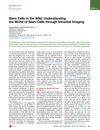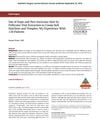23 citations,
October 1996 in “Dermatologic clinics” Genes affect cytokine production, which can influence chronic diseases, and certain interventions may help prevent related molecular damage.
[object Object]  January 2024 in “Scientific reports”
January 2024 in “Scientific reports” Egyptian Mint effectively kills mosquito larvae and inhibits certain bacteria.
 136 citations,
May 2016 in “Phytotherapy Research”
136 citations,
May 2016 in “Phytotherapy Research” Turmeric may have benefits for skin health, but more research is needed to confirm its effectiveness.
 70 citations,
February 2017 in “Dermatologic Surgery”
70 citations,
February 2017 in “Dermatologic Surgery” Treatment with plasma rich in growth factors improved hair density and thickness for hair loss patients.

 106 citations,
April 2013 in “Dermatologic Surgery”
106 citations,
April 2013 in “Dermatologic Surgery” Low-level light therapy safely improves hair growth and thickness for androgenetic alopecia.
November 2024 in “Dermatology Online Journal” Light-based therapies show promise as safe treatments for hair loss.
 January 2024 in “Annals of Agricultural and Environmental Medicine”
January 2024 in “Annals of Agricultural and Environmental Medicine” Red LED light therapy helps reduce hair loss and improves hair regrowth in long COVID patients.
 12 citations,
October 2012 in “Dermatologic Clinics”
12 citations,
October 2012 in “Dermatologic Clinics” Low-Level Laser Therapy and other light treatments for hair growth lack strong evidence and need more research.
 17 citations,
January 2010 in “PubMed”
17 citations,
January 2010 in “PubMed” Optimal storage solutions and effective additives are crucial for improving the survival of hair transplant grafts.
 6 citations,
January 2020 in “Skin Pharmacology and Physiology”
6 citations,
January 2020 in “Skin Pharmacology and Physiology” HIF-1α stimulators, like deferiprone, work as well as popular hair loss treatments, minoxidil and caffeine, in promoting hair growth.
 1 citations,
January 2019 in “Advances in Medical Sciences”
1 citations,
January 2019 in “Advances in Medical Sciences” The combination of azelaic acid, minoxidil, and caffeine significantly increased the survival of skin flaps by affecting certain body channels and nitric oxide levels.
 159 citations,
March 2014 in “Journal of The American Academy of Dermatology”
159 citations,
March 2014 in “Journal of The American Academy of Dermatology” Some skin medications are safe during pregnancy and breastfeeding, but others can harm the baby and should be avoided.
[object Object] 4 citations,
November 2021 in “Molecular Medicine Reports” Combining narrow-band ultraviolet B light and stem cell transplantation helps repigmentation in vitiligo by maintaining calcium balance in mice.
 1 citations,
November 2008 in “Acta crystallographica”
1 citations,
November 2008 in “Acta crystallographica” Scientists successfully created and analyzed the structure of a part of the human androgen receptor with specific modulators and a peptide to understand how it binds differently in various tissues.
 51 citations,
January 1989 in “Journal of Investigative Dermatology”
51 citations,
January 1989 in “Journal of Investigative Dermatology” Men with male-pattern baldness have more androgen receptors in their scalp's oil glands, which may contribute to hair loss.
 September 2013 in “Science”
September 2013 in “Science” Human stem cells can aid stroke recovery, research experiences boost students' career aspirations, minoxidil may reduce cancer spread, a molecule can slow tumor growth, a protein affects water flow in cells, magnesium behaves differently at tiny scales, and a new method detects slow-moving objects.
 November 2022 in “Journal of Investigative Dermatology”
November 2022 in “Journal of Investigative Dermatology” The study found that skin inflammation and immune response pathways are activated in Solar Urticaria patients after UV exposure, unlike in healthy people.
 17 citations,
December 2014 in “Cell Stem Cell”
17 citations,
December 2014 in “Cell Stem Cell” Intravital imaging helps us better understand stem cells in their natural environment and could improve knowledge of organ regeneration and cancer development.
March 2023 in “Medical lasers” Low-level laser therapy is a safe and effective treatment for hair loss.
10 citations,
April 2020 in “PloS one” Lack of Crif1 in hair follicle stem cells slows down hair growth in mice.
 17 citations,
April 2020 in “Dermatology and Therapy”
17 citations,
April 2020 in “Dermatology and Therapy” The PRP-like cosmetic product with postbiotics effectively treats hair loss in Alopecia areata.
 114 citations,
April 2004 in “International Journal of Dermatology”
114 citations,
April 2004 in “International Journal of Dermatology” Postinflammatory hyperpigmentation causes dark skin patches and needs personalized treatment.
 108 citations,
November 2006 in “Phytomedicine”
108 citations,
November 2006 in “Phytomedicine” Green tea component EGCG could potentially promote human hair growth.
 38 citations,
July 1989 in “Archives of dermatological research”
38 citations,
July 1989 in “Archives of dermatological research” Testosterone causes hair loss in AGA mice, which are good for testing baldness treatments, and both minoxidil and cyproterone acetate can prevent this hair loss.
 15 citations,
May 2015 in “Photomedicine and Laser Surgery”
15 citations,
May 2015 in “Photomedicine and Laser Surgery” Low-Level Laser Therapy may help with flap survival and burn scar healing, but not with venous ulcers or hair loss, and more research is needed.
 13 citations,
September 2015 in “Aesthetic Surgery Journal”
13 citations,
September 2015 in “Aesthetic Surgery Journal” Transplanting hair from the nape and around the ear to the hairline and temples generally satisfies patients and looks natural.
 3 citations,
January 2024 in “Cureus”
3 citations,
January 2024 in “Cureus” Folliculitis decalvans was successfully treated with doxycycline and ozenoxacin.

The document is a detailed guide on skin conditions and treatments for dermatologists.
 September 2013 in “Science”
September 2013 in “Science” Certain astrocytes can protect the brain and improve recovery after a stroke, and a hair loss drug might reduce cancer spread.
























